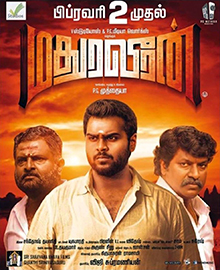Madura Veeran
Madura Veeran (also spelled as Madurai Veeran) is a Tamil folk deity popular in the southern parts of Tamil Nadu, India. He is revered as a guardian deity and is often associated with the protection of villages and fields. The worship of Madura Veeran is deeply rooted in the cultural and religious traditions of the Tamil people.
Legend[edit | edit source]
The legend of Madura Veeran varies across different regions, but a common narrative describes him as a valiant warrior who was born to a royal family. According to the legend, Madura Veeran was the son of a Pandya king and a celestial being. He grew up to be a brave and skilled warrior, known for his strength and valor.
Madura Veeran fell in love with a woman of lower caste, which led to his tragic end. Despite his royal lineage, he chose to marry her, defying the social norms of the time. This act of defiance angered the king, who ordered his execution. After his death, Madura Veeran was deified by the local people, who began to worship him as a protector and guardian.
Worship[edit | edit source]
Madura Veeran is worshipped in numerous temples across Tamil Nadu. These temples are often small shrines located at the entrance of villages or near agricultural fields. Devotees believe that Madura Veeran protects them from evil spirits, diseases, and other calamities.
The worship of Madura Veeran typically involves offerings of flowers, fruits, and animal sacrifices. Devotees also perform folk dances and songs in his honor. The annual festival dedicated to Madura Veeran is celebrated with great fervor, featuring processions, music, and dance.
Iconography[edit | edit source]
Madura Veeran is usually depicted as a fierce warrior, often shown riding a horse and wielding a sword. He is adorned with traditional Tamil warrior attire, including a turban and a dhoti. His iconography symbolizes his role as a protector and guardian.
Cultural Significance[edit | edit source]
The worship of Madura Veeran reflects the syncretic nature of Tamil religious practices, blending elements of Hinduism with local folk traditions. He is considered a symbol of bravery, loyalty, and defiance against social injustice. The legend of Madura Veeran also highlights the complex social dynamics and caste issues prevalent in Tamil society.
Related Deities[edit | edit source]
Madura Veeran is often associated with other Tamil folk deities such as Ayyanar, Karuppu Sami, and Muneeswarar. These deities are collectively known as the Kaval Deivam or guardian deities, and they play a crucial role in the rural religious landscape of Tamil Nadu.
See Also[edit | edit source]
Categories[edit | edit source]
Search WikiMD
Ad.Tired of being Overweight? Try W8MD's physician weight loss program.
Semaglutide (Ozempic / Wegovy and Tirzepatide (Mounjaro / Zepbound) available.
Advertise on WikiMD
|
WikiMD's Wellness Encyclopedia |
| Let Food Be Thy Medicine Medicine Thy Food - Hippocrates |
Translate this page: - East Asian
中文,
日本,
한국어,
South Asian
हिन्दी,
தமிழ்,
తెలుగు,
Urdu,
ಕನ್ನಡ,
Southeast Asian
Indonesian,
Vietnamese,
Thai,
မြန်မာဘာသာ,
বাংলা
European
español,
Deutsch,
français,
Greek,
português do Brasil,
polski,
română,
русский,
Nederlands,
norsk,
svenska,
suomi,
Italian
Middle Eastern & African
عربى,
Turkish,
Persian,
Hebrew,
Afrikaans,
isiZulu,
Kiswahili,
Other
Bulgarian,
Hungarian,
Czech,
Swedish,
മലയാളം,
मराठी,
ਪੰਜਾਬੀ,
ગુજરાતી,
Portuguese,
Ukrainian
Medical Disclaimer: WikiMD is not a substitute for professional medical advice. The information on WikiMD is provided as an information resource only, may be incorrect, outdated or misleading, and is not to be used or relied on for any diagnostic or treatment purposes. Please consult your health care provider before making any healthcare decisions or for guidance about a specific medical condition. WikiMD expressly disclaims responsibility, and shall have no liability, for any damages, loss, injury, or liability whatsoever suffered as a result of your reliance on the information contained in this site. By visiting this site you agree to the foregoing terms and conditions, which may from time to time be changed or supplemented by WikiMD. If you do not agree to the foregoing terms and conditions, you should not enter or use this site. See full disclaimer.
Credits:Most images are courtesy of Wikimedia commons, and templates Wikipedia, licensed under CC BY SA or similar.
Contributors: Prab R. Tumpati, MD

